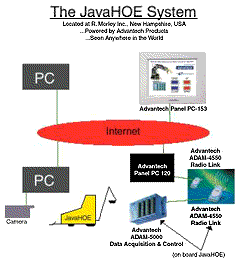|
 When
Dick Morley, inventor of the programmable logic controller (PLC),
gets an idea, people usually listen. But when Morley suggested
a German car company use American PLCs over German PLCs, they
weren't willing to listen since they were biased toward German
products. When
Dick Morley, inventor of the programmable logic controller (PLC),
gets an idea, people usually listen. But when Morley suggested
a German car company use American PLCs over German PLCs, they
weren't willing to listen since they were biased toward German
products.
So Morley
and Modicon decided to use drastic measures. They told the engineers
at the German car company that they could create a system that
would allow a laptop in Germany to control a backhoe at Morley's
New Hampshire farm. Needless to say, Morley had gotten their attention.
But just as
the project - now named JavaHOE - began progressing, Modicon pulled
funding of the system. Morley and his wife, Shirley, who believed
in the project, were not discouraged. Morley wanted to show the
traditional board rooms across the country that prediction of
Internet control of the enterprise was not only going to happen,
it could be done inexpensively. They made a decision to continue
the funding themselves, bringing in an additional expert, Jan
Grondstra, to help.
There was
still one problem. They needed a company to supply the products
for the JavaHOE.
Just about
this time, Morley had begun talking to a company - Advantech -that
provided PC-based industrial automation solutions. Advantech wanted
Morley to speak at their 2000 worldwide conference on the creation
of the PLC and his vision for the future of web-enabled manufacturing.
After doing a little research on the company, Morley agreed. But
what he also found in his research was that Advantech had the
capabilities to provide a complete product solution for JavaHOE
- from the human machine interface to the wireless data transfer.
Thus began
a new partnership for JavaHOE.
How
it works
The JavaHOE
System incorporates Advantech products into a solution to collect
data and control the backhoe at Morley's farm. The information
is sent via remote data transfer to another location, which supplies
the user computer with the data and the ability to control the
backhoe. In the meantime, a camera attached to a PC which monitors
the backhoe allows the user to view over the Internet exactly
what they are doing.
Morley and
Grondstra found that the conversion of the hydraulic system to
PLC I/O was difficult, as well as the parallel operation of PLC
and Manual. To alleviate the problem, a pluggable electric valve
running parallel and simultaneously with the manual controls was
created. But the case was not Web compatible, so the product was
downsized to use four variables: boom, dipper, bucket and swing.
Morley removed the old hardware and inserted the Advantech PC-based
control. The PC acted as the server, and the Advantech ADAM-5000
acting as the PC-based I/O control allowed the JavaHOE to be remotely
controlled. From this point on the network capability was added
given the remote operator the capability to move each and all
variables in one or the other direction.
Using this
information, Advantech put together a web-enabled solution to
transfer the data from the New Hampshire farm to the user's fingertips
any where in the world. To provide Morley with a complete solution,
Advantech also enlisted one of its partners, InduSoft, to provide
the software for the project.
Building on
Morley's original design, Advantech began identifying which of
its product solutions would best fit with Morley's needs.
The
products
At the initial
JavaHOE location, Advantech's ADAM-5000 was used as a distributed
DA&C solution with enlarged I/O capacity for industrial automation
applications. It was used to control the JavaHOE's I/O of 12 volts
that ran the backhoe's boom, dipper, bucket and swing to move
soil.
The ADAM-5000
then transmits data, at rates up to 115.2Kbps, to the ADAM-4550.
This product is a Direct-Sequence Spread Spectrum radio modem
that provides the link for sensor data transfer through wireless
communication. With a radius of 20-km transmission with an external
antenna, the ADAM-4550 sends the data to another ADAM-4550 at
the host computer's end.
This information is relayed to a panel PC (PPC-120) which was
specifically designed for monitoring devices and interfaces for
information applications, along with wireless data transmission.
The user computer's screen then has access to the data though
a secure Internet transfer from the PPC-120. The user can then
monitor and send data back through the chain to the original ADAM-5000
at the New Hampshire farm to dip the backhoe arm, scoop up the
soil, swing it to one side and dump the soil in another location.
The
results
Probably the best record of the results is that
the system works. At the ISA show this year, Morley demonstrated
his project at the Advantech booth. People at the New Orleans
show were lining up to try their hand at moving a backhoe in New
Hampshire. The only drawback was that after three days of intensive
demonstrations, the hydraulic hose was broken at the ISA show
because the users could not view how fast the backhoe arm was
moving and moved it past its physical capability within the soil.
Of course,
the web solution was still intact, giving the world proof of Internet
control of the enterprise at a cost, according to Morley, that
is like peanuts.
"Boardrooms
across the world now can demand the connection of plant equipment
to the Internet for a reasonable cost," said Morley. "And Advantech
wins again because they are the low-cost leader."
|

